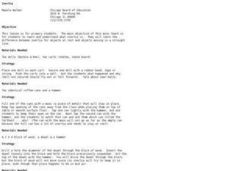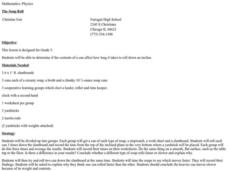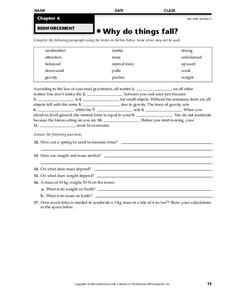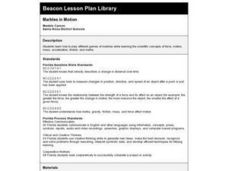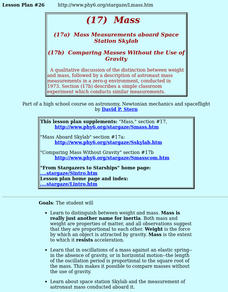Curated OER
The Inertial Balance
Students weigh objects using a triple beam balance. In this mass lesson, students use an inertial balance made with a metal rod to measure and graph vibrations of varying numbers of pennies in a bucket. References and discussion prompts...
Curated OER
How Can We See Inertia?
Students conduct 8 experiments to gain an understanding of inertia. Students use a variety of materials to conduct these experiments. Students learn the difference between objects at rest and objects moving in a straight line.
Curated OER
The Soup Roll
Fifth graders roll different sized cans down an inclined ramp in order to determine if the contents of a can affect the speed at which is rolls. For this physics lesson, 5th graders work in small groups to send each can down the ramp...
Curated OER
Forces and Motion
In this forces worksheet, students explain how a car's motion is affected by different forces. This worksheet has 3 short answer questions.
Curated OER
Isaac Newton's 3 Laws of Motion
In this motion activity, students review Newton's Laws of Motion including terms such as inertia and net force. Students complete 11 matching, 7 fill in the blank, and 7 problems to solve.
Curated OER
A Quiz About Newton's Laws
In this Newton's laws worksheet, learners review the definitions of the law of inertia, law of acceleration, and the law that relates force to acceleration. This worksheet has 10 short answer questions.
Curated OER
A Worksheet About Newton's Laws
In this Newton's laws worksheet, students review the law of inertia, the law of acceleration, and the law relating force to acceleration. This worksheet has 10 short answer questions.
Curated OER
Angular Momentum
In this momentum learning exercise, students use linear momentum to determine velocity and angular momentum to determine angular velocity. This learning exercise has 1 problem to solve.
Curated OER
Forces and Pressure
In this forces worksheet, students will review the different types of forces and how forces are measured. This worksheet has 9 fill in the blank, 1 short answer, and 11 multiple choice questions.
Curated OER
Forces and Machines
In this forces and machines activity, students will review vocabulary associated with forces including friction, inertia, and work. Students will also explain how simple machines help to do work easier. This activity has 10 matching, 6...
Curated OER
What is Momentum?
In this momentum worksheet, students will complete two fill in the blank statements on inertia and momentum. Then students will compare the momentum of a bowling ball and baseball with differing masses and velocities in 3 short answer...
Curated OER
Why Do Things Fall?
In this science worksheet, students complete a paragraph using 15 given terms. For example, "How can a spring be used to measure force?"
Curated OER
Introduction to Forces and Inertia
Young scholars explore the basic underlying concepts of Newton's first law of motion. They discuss forces and brainstorm different examples of force and what they act on. Students examine force by observing springs and gravity. They...
Curated OER
The Law of Inertia
Students practice the 4 question strategy to form more questions and develop further experiments. The four questions are engage, explore, explain, and elaborate. They use the 4 question strategy on an investigation involving the mass...
Curated OER
Inertia
Students conduct an experiment to apply Newton's first law of motion. They observe the inertia of an object in regard to its mass. The students record and graph the outcomes of their investigation and present the relationship between...
Curated OER
Sliding and Stuttering
Ninth graders use a spring scale to drag an object such as a ceramic coffee cup along a table top or the floor. The spring scale allows them to measure the frictional force that exists between the moving cup and the surface it slides on....
Curated OER
Roller Coaster Simulator for the Magnetic Chalkboard: Construction Plans
Pupils watch a demonstration that allows the teacher to show Galileo's inertia experiment and how and why the hills on roller coasters are designed as they are. The roller coaster simulator can be mounted on a magnetic chalkboard;...
Curated OER
Gravity, Forces, and Inertia
Learners participate in assessments involving gravity, forces, and inertia. They select from a menu of options assessments they would like to complete including worksheets, drawing posters, watching videos, creating crossword puzzles,...
Curated OER
Laws of Motions
Seventh graders explore the Laws of Motion. They define friction and explain the concept of inertia. Students explain what happens when a force is exerted on an object that is in equilibrium. They state the second and third laws of motion.
Curated OER
Multimedia to Learn Textbook Science
Learners work in cooperative groups to produce multimedia presentations to explain how the movement of a yo-yo. Students research information about force and motion and relate it to the movement of the yo-yo.
Curated OER
A Multimedia Presentation to Describe Newton's Laws of Motion
Eighth graders use various sources to find pictorial evidence of Newton's laws of motion in everyday life. They use various sources of technology to import those pictures into a multimedia presentations.
Curated OER
Newton and his Laws
High schoolers explore Newton's laws, including what they state, and what the intuitive meaning is of the first and third laws.
Curated OER
Marbles in Motion
Fourth graders explore how to play marbles while learning the scientific concepts of force, motion, mass, acceleration, friction, and inertia.
Curated OER
Mass
High schoolers participate in a qualitative discussion of the distinction between weight and mass, followed by a description of astronaut mass measurements in a zero-g environment.



